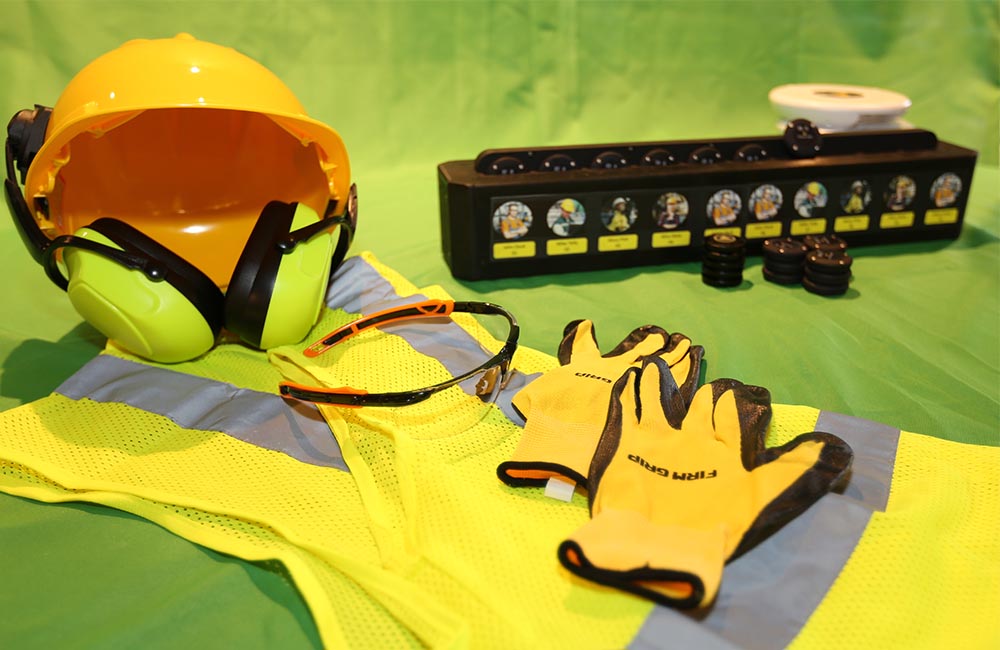As businesses across New York State navigate reopening, Iterate Labs, an eLab alumni startup formerly known as OrthoFit (Class of 2017), expanded the features of its wearable technology and biomotion analytics platform to ensure social distancing compliance and rapid contact tracing in the workplace, enabling companies to bring employees back to work safely amid the COVID-19 pandemic.
The startup was launched by Cornell alumni Jason Guss, Ph.D. ’18 and Apoorva Kiran, Ph.D. ’17 with the aim of creating wearable technologies to reduce workplace repetitive-use injuries and provide insights into industrial operations. The founders, who were completing doctoral programs in biomedical engineering and mechanical engineering at the time, were inspired in part by their own back and hand pain incurred from countless hours hunched over with pipettes in a Weill Hall basement lab.
“Through my studies at Cornell, I learned that repetitive-use injuries are a huge problem for the industrial workforce and after working and conversing on the topic regularly with Apoorva, we decided to apply our technology ideas and skills. One of the industries we focused on first was meat processing, as its workers have historically had the highest rate of repetitive injuries,” said Guss, CEO and co-founder.
In 2016, the founders developed the prototype for their first product—a “smart” glove embedded with sensors to track hand and wrist movements—while participating in the Napkin-to-Prototype Hardware Accelerator led by Rev: Ithaca Startup Works, before joining the incubator as a member in 2018. In 2017, the founders participated in eLab, where they continued to develop their business idea.
Since then, Iterate Labs has grown into a biomotion analytics platform, digitizing human motion using wearable devices to provide analytics and insights for productivity and safety applications. In response to COVID-19, the startup has augmented its platform and technology to provide social distancing and contact tracing solutions, which are powered by ultra-wide band (UWB) technology. The platform uses wearables, which can be attached to a worker’s wrist or arm or be worn around the neck, are able to measure and enforce social distancing with audio and haptic alerts intended to notify workers when they are too close to their colleagues. The wearables are synced to an online dashboard, which helps mitigate risk by quickly identifying who may have been exposed to a worker with COVID-19 and allowing operations managers to be proactive in limiting the spread of the illness.
During the startup’s initial R&D for a social distancing solution, the engineering team realized using Bluetooth low-energy (BLE) technology was producing false alarms, and something more reliable was required. “UWB technology is used, which is very accurate with precision less than 10 centimeters” said Kiran, CTO and co-founder. “With UWB technology, we don’t see false alarms, which is important, because a false positive makes people nervous in the workplace and a false negative could lead to the spread of COVID-19.”
Additionally, the team examined issues like privacy and liability, when developing the software that connects to the wearables. Yunyun Wang ’21, a 2020 Kessler Fellow and College of Engineering student, conducted extensive customer interviews to inform the user-interface (UI) side of the software development and recently published an open call for designing privacy-protective and human-centered contact tracing tools that has received attention from the industry. Wang also completed a contract tracing certification program issued by the CDC to learn how data collected from contract tracing can be used in adherence to the privacy of employees and incorporated these guidelines into the software design for this project.
“The most important consideration when designing such tools is addressing how we can develop technology that produces life-saving insights for containing the spread of COVID-19 without jeopardizing individual privacy rights,” explains Wang. “This is a complex issue, since the data involves individuals’ personal contacts. However, contact tracing tools can offer additional privacy protections when such considerations are built into the design of data collection process and analysis.”
Additionally, another College of Engineering student, Ambikaa Jaggi ’21 was instrumental to adapting the startup’s UX design to the challenge of social distancing in the workplace. “She knew our safety platform in and out and was able to whip up a new solution and hit the ground running in a relatively short amount of time,” states Kiran.
Iterate Labs’ social distancing and contact tracing solution can be adapted to a variety of work environments, including factories, research laboratories, senior living homes, and offices. The startup’s platform as well as their core platform are currently being piloted in a Cornell research lab, as well as in some of the largest food processors in the United States, representing nearly half of meat processors and half a million workers. The startup attributes much of its success to its Cornell beginnings.
“We’re kind of the archetype of a Cornell startup. At every step of the way, we’ve utilized every resource, funding opportunity, connection, and mentor available and to this day, Cornell is still providing value to us. Cornell has fostered a community that encourages us to give back in terms of providing mentorship and internships to other entrepreneurs—in fact, we field a number of calls every month with Cornellians who are looking for feedback,” said Guss.
The startup is looking to connect with other companies that may be interested in piloting or deploying its social distancing and contact tracing platform to help bring their teams back to work safely. Inquiries can be sent directly to [email protected].
A version of this article appears in the Cornell Chronicle.

